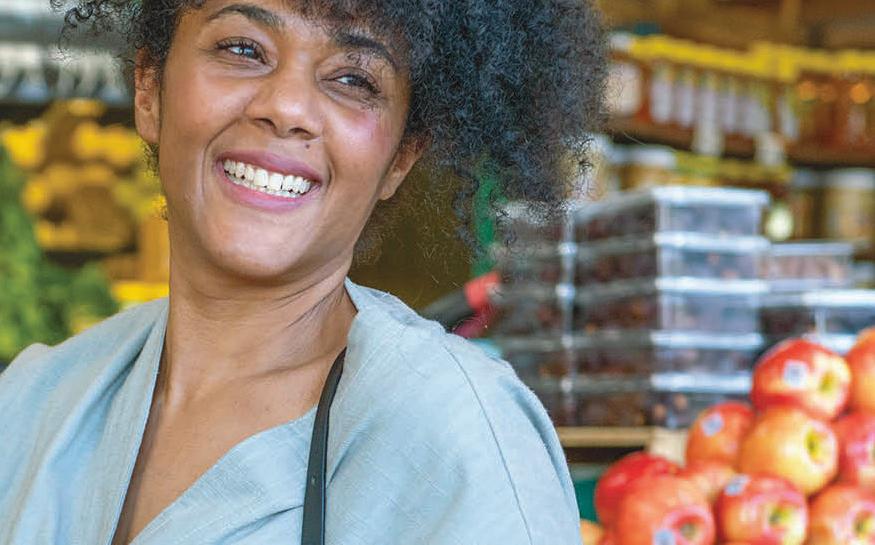
12 minute read
See Giorgio
(Continued from page 1) he got that cessation of benefi ts letter and checks stopped coming. As usual, his story is punctuated with asides, sometimes tirades, about the cost of a Korean car parked nearby, about a stoned or drunk tattooed guy who sat on his bus bench and bothered him. He veers to a tale about his restaurant days when Elizabeth Taylor sat at the bar at noon and was drunk by 2 p.m., about unisex hair salons, about how smells affect people. “Some people can’t stand the smell of cigarettes … some can’t stand the smell of dog food or cat poo.” Giorgio believes he cannot get shelter until he gets his money. That isn’t technically true, but steps to getting housed are confusing, and there are more people in need than there are available beds. Just do a Google search “How does a homeless person fi nd housing in Los Angeles,” and dozens of governmental and nonprofi t agencies pop up. Giorgio has neither a computer nor a phone, so navigating these services is diffi cult.
Help is out there In fact, numerous people who know Giorgio from the Boulevard or have observed him on his daily walks around the neighborhood want to help him and have contacted friends at agencies that work in this arena. The People Concern, a group of professionals and volunteers whose mission it is to end homelessness, has apparently taken up the Giorgio cause and has tried to reach out to him. Out of respect for client privacy, The People Concern doesn’t discuss specifi cs of their work, but when I ask Giorgio whether he’s been apwanted to be housed, and he told her that he did, so she called homeless advocate Marilyn Wells, whose six-month column “The NIMBY Diaries” appeared in the Larchmont Chronicle this spring, and who co-founded Stories from the Frontline. Wells had heard about Giorgio from numerous sources and so spread the word. Do-gooders “Giorgio is very savvy about do-gooders,” Rev. Anderson cautions. “… People who want to help him but don’t have the resources to help.” Most Angelenos see evidence of our city’s failure on homelessness every day: adults cocooned in blankets in front of pandemic-closed stores or standing with cardboard signs asking for help. We see tent cities in alleys, in front of abandoned warehouses, clustered at the ends of our blocks. The problem seems unsolvable and too often we just walk by. There’s something about Giorgio, however, with his knit beanie and fl ushed cheeks, with his endless opinions and (mostly) friendly demeanor, that calls to people. While speaking with Giorgio one day, a steady stream of passersby helped him in little ways. “Do you want coffee?” one man asked on his way into Peet’s. “Yes! With cream and extra sugar!” Giorgio answered. “Do you want this breakfast taco?” someone else asks. “Thank you, I’ll take it!”
The shopping cart “I gotta change shopping carts,” Giorgio announces one morning. “It’s broken. I cannot put a lot of things in there.” The cart appears to be held together with bungee cords, and the frame is bent. A few weeks prior, an out-of-control car careened across Beverly Boulevard onto the sidewalk and smacked into his cart, spilling books, papers, clothing, blankets and cigarettes everywhere and breaking his only piece of property. Giorgio recounts, “It was about 1:30 [in the morning].” He lost quite a few of his possessions in the crash, but he was alright. “If I hadn’t stood up from the bench [where he sleeps], he would have hit me. He’s lucky, too. I don’t know how it happened. I don’t know who it was. Man, woman, someone under the infl uence of drugs or alcohol.” Giorgio wondered if the driver would have been hurt if the car hadn’t hit the cart and instead bounced into oncoming traffi c. “Nothing happened to him when he hit the shopping cart.” That leaves Giorgio with a dilemma, fi nding another shopping cart. He won’t just take one from Pavilion’s. “Sometimes you fi nd a shopping cart in an alley,” he explains. “Last time I gave $10 to a homeless guy under a bridge. He had about two or three. One was empty. I said, ‘I’ll give you $10
They do care, it turns out, but it isn’t easy to turn sympathy into success. “It takes time to build up the trust of people to keep them going toward housing,” observes The Rev. Betsy Anderson, a lifelong local resident who is an Episcopal priest with a pastoral minGIORGIO pushes his cart up Larchmont Boulevard wearing his signature knit beanie. istry at Skid Row through the Church of the Nazarene outproached about housing he reach center. “Street people repeats his mantra, “I need my are survivors. They know how money! Money fi rst! … When to protect their privacy. They I get my check we can talk don’t want to follow someone about [housing].” He pauses, else’s rules.” then continues, “Something Rev. Anderson fi rst met Giorhappened to me, nobody cares gio when they were neighbors; about it. Nobody’s concerned she in a home on Lorraine if I have money in my pocket Boulevard and he on a bus or not. That I have diffi culty bench at the corner, on Third with my family, with the gov- Street. She worried about him. ernment for unemployment Rev. Anderson is one of the benefi ts, all things like that. people who sought help for They don’t care.” Giorgio. She once asked if he



Always in Season ... Season ...



Since 1934



While the days of Summer may be waning, the weather still calls for barbecues, outdoor dining and fresh seasonal groceries from The Original Farmers Market. Our family of artisan grocers offer the best for your table with the finest selection of top quality meats & poultry, fresh-caught seafood, ripe produce, warm-from-the-oven baked goods and more—all set against our breezy open-air backdrop. We invite you to enjoy the rest of the season with the best of the season. Open daily.




(Continued from page 30) for the shopping cart’ and he said ‘yes.’” This was two years ago, when he fi rst got his current, now broken, cart. “Believe me, it’s a good deal for a shopping cart.” Giorgio’s friends Giorgio often talks about people he meets on the Boulevard as his friends. This time, however, he mentions friends from his pre-homeless life. “One who passed away, Daniel, Irish, from Boston, Massachusetts. He read the Bible all the time. He always carried the Bible with him. He’s a sober alcoholic. I met him in a coffee shop a long time ago.” He continues: “Keith. I haven’t seen him for a long time. I lost his phone number. He had an apartment in Hollywood. He was in the music business. Rock ‘n’ roll. Met him at the meeting.” It turns out that Giorgio made friends in Alcoholics Anonymous meetings that met in coffee shops in Santa Monica, Culver City and West Los Angeles, although he only admits to having done some drugs, not alcohol. “Sometimes when you’re young, you do a little marijuana. Addiction is addiction.” Either way, he’s sober now, so the program’s benefi ts lasted, even if his friends have disappeared. As has his ex-wife. Giorgio met Maria at a bus stop in Highland Park, near where he lived at the time. “She’s from Mexico. Different from women in California,” he says by way of description. They married and had two sons, Hector and Cesar. In the early days of their marriage, when fi rstborn Hector was a toddler, Giorgio had another coffee shop experience. “I met a woman in Beverly Hills and, believe it or not, I had the opportunity to be with the woman and get really well fi nancially. She had a big house and drove a Rolls Royce.” He was having breakfast and she was seated alone at another table. They started talking. “The next time, I’m sitting at a table and she came in the door and sat with me. She offered me a lot of things, and I refused. I was very young, 20 years old.” The nameless woman told him he would have free rent, a salary, and a car. He would be the housekeeper and cook. The implication was that he would be more. “I had other plans,” Giorgio explains. “I was married. And a son who was two years old. If I was single, I would have taken the offer, but I was fresh married. The offer was pretty good, but I didn’t want to cheat on my wife. I try to be honest.” Almost as a coda to his story, Giorgio adds, “My father told me you cannot be honest in this life 100 percent. There’s a price to pay, even if you want to be.” He’s vague about their life together or why the marriage ended. ”I am divorced, but I don’t wanna talk about it. Nice person, but everybody’s got problems.” He adds, “All women get attached to a man in some way,” he says. “They use a man somehow.” Giorgio thinks his ex-wife is still in Los Angeles. He called her when he was looking for his sons, but she didn’t pick up, and there’s no way she can call him back. He wishes her phone message would include a time when she’d be reachable. The sons Giorgio’s 34-year-old son Hector visited him “before the masks.” Giorgio continues, “we had a conversation for about half an hour. He said ‘OK, I’ll see you next week!’ It never happened.” Giorgio has repeatedly called him, but Hector never answers. It’s clear this both perplexes and pains Giorgio. “I don’t know why he doesn’t pick up the phone. Why he doesn’t come visit me.” He knows little about his son’s life except that he works various construction jobs. His 32-year-old son Cesar “… had problems with drugs. The other one is more responsible.” Cesar is in jail, or at least was the last time Giorgio heard any news. “I don’t know if he’s released by the courts,” Giorgio muses. “Maybe he can go back to school and take some kind of vocational training.” Giorgio wants to fi nd out Cesar’s status, but “I have no way to reach him. I’m the father and I want to know where he is. This cannot be done over the phone. It’s not pizza delivery!” Memories of Italy Giorgio does occasionally talk with his two remaining siblings in Italy. He happily shares details about their lives and children, obviously proud of them both. His brother, Julio, is 70 years old now and owns property in a small country village near Bologna, where there’s “good food and the best restaurants! Lots of ice cream. Red wine.” Julio has two daughters; one is a child psychologist; Giorgio forgets what the other one does. His sister, Bianca, lives in Rimini, about 80 miles from Julio’s village. She has a daughter and two sons. One son is a welder, and the other is a machine operator who cuts marble. “Marble is a big business,” Giorgio says, obviously impressed. He lists places where marble is regularly installed. “Restaurants, hotels, houses. Big Business!” He describes a fi ve-bedroom condominium that a deceased brother once owned in the Roman hills and that had marble fl oors throughout. “Floors in the living room, dining room, bathrooms. The kitchen had tile, green marble. Cool, but put down rugs. In summer, you can sleep on it. It’s fresh!” Giorgio stayed in that Roman condo once, and it’s obviously a cherished memory, from back when he still lived in Italy and worked and was surrounded by family and enjoyed traveling around Europe. “Paris is beautiful. Europe is beautiful. Every country has its own beauty,” he refl ects. “Even here is beautiful. North Dakota, Utah, Montana is nice. Idaho is beautiful. Tennessee, Connecticut. Beautiful there. Paradise.” Giorgio hasn’t visited any of those states. He learned about the grandeur of our country by looking at pictures. A moment later, someone walks up and tucks a wad of cash in Giorgio’s cart. A neighbor who can see Giorgio’s bus bench from her home and wishes to remain anonymous describes him as an angel who has been “… blessed with the God-given strength to live.” She knows he walks miles and miles each day because she has observed him as far away as Fairfax and Sunset. In the wee hours, she takes comfort when “I hear his grumbling voice coming in through the window … he is bedding himself down to sleep behind his cart; his only refuge.” Giorgio turns 57 on October 18. Perhaps his next turn around the sun will fi nd him ensconced in a warm room with a door.
The Larchmont Chronicle introduced Giorgio in our February 2021 issue.






Friends ... Community ...
HOME
It’s your time. The new beginnings you have been looking forward to are here! Spend it your way at Kingsley Manor, a thriving four-acre oasis in the heart of Hollywood.



